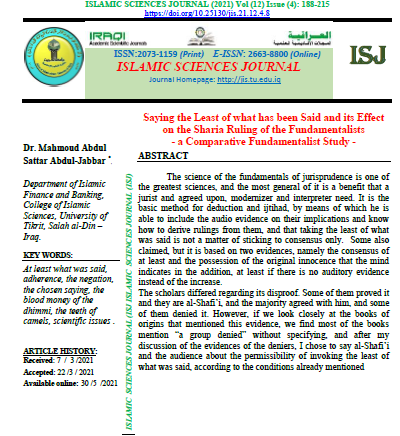Saying the Least of what has been Said and its Effect on the Sharia Ruling of the Fundamentalists - a Comparative Fundamentalist Study -
Main Article Content
Abstract
The science of the fundamentals of jurisprudence is one of the greatest sciences, and the most general of it is a benefit that a jurist and agreed upon, modernizer and interpreter need. It is the basic method for deduction and ijtihad, by means of which he is able to include the audio evidence on their implications and know how to derive rulings from them, and that taking the least of what was said is not a matter of sticking to consensus only. Some also claimed, but it is based on two evidences, namely the consensus of at least and the possession of the original innocence that the mind indicates in the addition, at least if there is no auditory evidence instead of the increase.
The scholars differed regarding its disproof. Some of them proved it and they are al-Shafi’i, and the majority agreed with him, and some of them denied it. However, if we look closely at the books of origins that mentioned this evidence, we find most of the books mention “a group denied” without specifying, and after my discussion of the evidences of the deniers, I chose to say al-Shafi’i and the audience about the permissibility of invoking the least of what was said, according to the conditions already mentioned
Article Details

This work is licensed under a Creative Commons Attribution 4.0 International License.
COLLEGE OF ISLAMIC SCIENCES, TIKRIT UNIVERSITY. THIS IS AN OPEN ACCESS ARTICLE UNDER THE CC BY LICENSE http://creativecommons.org/licenses/by/4.0/

